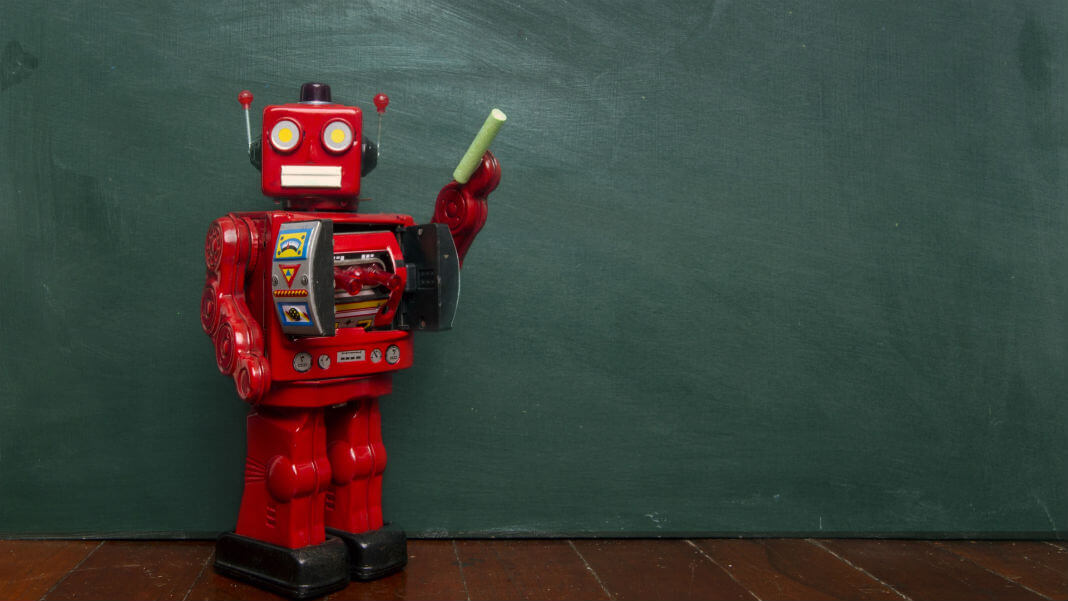We’ve all heard the warning cries: automation will disrupt entire industries and put millions of people out of jobs. In fact, up to 45 percent of existing jobs can be automated using current technology.
copyright by singularityhub.com
 However, this may not necessarily apply to the education sector. After a detailed analysis of more than 2,000-plus work activities for more than 800 occupations, a report by McKinsey & Co states that of all the sectors examined, “…the technical feasibility of automation is lowest in education.” There is no doubt that technological trends will have a powerful impact on global education, both by improving the overall learning experience and by increasing global access to education. Massive open online courses (MOOCs), chatbot tutors, and AI-powered lesson plans are just a few examples of the digital transformation in global education . But will robots and artificial intelligence ever fully replace teachers?
However, this may not necessarily apply to the education sector. After a detailed analysis of more than 2,000-plus work activities for more than 800 occupations, a report by McKinsey & Co states that of all the sectors examined, “…the technical feasibility of automation is lowest in education.” There is no doubt that technological trends will have a powerful impact on global education, both by improving the overall learning experience and by increasing global access to education. Massive open online courses (MOOCs), chatbot tutors, and AI-powered lesson plans are just a few examples of the digital transformation in global education . But will robots and artificial intelligence ever fully replace teachers?
The Most Difficult Sector to Automate
While various tasks revolving around education—like administrative tasks or facilities maintenance—are open to automation, teaching itself is not. Effective education involves more than just transfer of information from a teacher to a student. Good teaching requires complex social interactions and adaptation to the individual student’s learning needs. An effective teacher is not just responsive to each student’s strengths and weaknesses, but is also empathetic towards the student’s state of mind.
It’s about maximizing human potential
Furthermore, students don’t just rely on effective teachers to teach them the course material, but also as a source of life guidance and career mentorship. Deep and meaningful human interaction is crucial and is something that is very difficult, if not impossible, to automate.
Automating teaching is an example of a task that would require artificial general intelligence (as opposed to narrow or specific intelligence). In other words, this is the kind of task that would require an AI that understands natural human language, can be empathetic towards emotions, plan, strategize and make impactful decisions under unpredictable circumstances. This would be the kind of machine that can do anything a human can do, and it doesn’t exist—at least, not yet. […]
read more – copyright by singularityhub.com


We’ve all heard the warning cries: automation will disrupt entire industries and put millions of people out of jobs. In fact, up to 45 percent of existing jobs can be automated using current technology.
copyright by singularityhub.com
The Most Difficult Sector to Automate
While various tasks revolving around education—like administrative tasks or facilities maintenance—are open to automation, teaching itself is not. Effective education involves more than just transfer of information from a teacher to a student. Good teaching requires complex social interactions and adaptation to the individual student’s learning needs. An effective teacher is not just responsive to each student’s strengths and weaknesses, but is also empathetic towards the student’s state of mind.
It’s about maximizing human potential
Furthermore, students don’t just rely on effective teachers to teach them the course material, but also as a source of life guidance and career mentorship. Deep and meaningful human interaction is crucial and is something that is very difficult, if not impossible, to automate.
Automating teaching is an example of a task that would require artificial general intelligence (as opposed to narrow or specific intelligence). In other words, this is the kind of task that would require an AI that understands natural human language, can be empathetic towards emotions, plan, strategize and make impactful decisions under unpredictable circumstances. This would be the kind of machine that can do anything a human can do, and it doesn’t exist—at least, not yet. […]
read more – copyright by singularityhub.com
Share this: